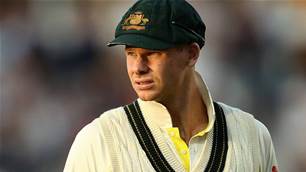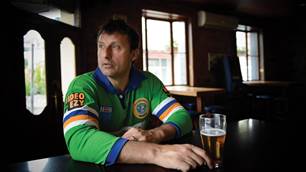Our winners and losers from a busy month of sport.
Presenting Inside Sport’s “winners” and “losers” from a massive past month of sport.
THE WINNERS ...
 (Photo by Getty Images)
(Photo by Getty Images)WIDESPREAD FIFA REFORMS
In a FIFA presidential election that featured some truly memorable names (we’ll never forget you, Tokyo Sexwale) and rather literal calls for transparency (one of the candidates, Prince Ali, had flown in clear voting booths that went unused), it went unnoticed that the more significant vote may have been the one passing a set of widespread reforms. The reaction to Gianni Infantino’s elevation to the president of world football was guarded – while he’s sounding the right noises, it was rather bemusing that it’s yet another Swiss person in the job (Infantino’s home town is less than 10km from Sepp Blatter’s) and he was close to Michel Platini from their days at UEFA. But the mere fact of Blatter’s replacement represents hope, as do the changes to FIFA governance: a limit of three terms of four years for the president, the replacement of the executive committee by a 36-member FIFA council which will have at least six female representatives, the separation of the strategic and commercial functions between the council and secretariat respectively, and disclosure of salaries. Still, critics pointed out that FIFA has hardly been overhauled. The criminal investigations remain ongoing, as do the questions surrounding the 2018 and ’22 World Cups. But if a renewed FIFA is actually possible, we’ll now have the chance to find out.
SYDNEY’S STADIUM PLANS
Reality seems to have set in on Sydney’s stadium plans, with more than a bit of politics, too. The NSW government’s policy flip, which will see the proposed new stadium in Moore Park go by the wayside in favour of multi-million-dollar upgrades for ANZ and Allianz, has the virtue of serving Sydney’s actual needs. It may lack the sizzle of Melbourne and Adelaide’s vibrant sporting-and-social scenes, but maybe that’s the wrong way to think about the Harbour City – if you build it, they will not necessarily come. A rectangular ANZ that provides world-class fan experience for Origin, Bledisloe and Socceroos matches makes sense, as well as upgrades that will cater to the venues’ most regular users in the NRL. Beyond that, it’s up to the fans of Sydney to make the case for why there should be any more publicly funded largesse on high-level playgrounds, rather than just city envy. Maybe the Keep Sydney Open campaign can make this their next focus ...
WEST PAPUA WARRIORS
Sport and politics have always mixed, from Jack Johnson crossing the colour line in 1908 to become World Heavyweight boxing champion to the Palestine football team qualifying for the 2015 AFC Asian Cup. The latest addition is the West Papua Warriors, a rugby league team created in Port Moresby to inspire the younger generation of Papua New Guineans to learn about and support the West Papua independence struggle. The team features a mix of players from the many tribes of Papua New Guinea blended with West Papuan players who learnt the game in refugee camps. Underlining its political aim, the West Papua Warriors’ jersey features a raised fist, the international symbol of resistance, and the banned red white and blue “Morning Star” flag. As the first-ever West Papua representative team in any sport, they were formally blessed by leaders of the Free Papua Movement before flying to Australia to make their international debut, sadly leaving behind some key West Papua refugee players due to visa issues. On February 5, 2016 the West Papua Warriors ran on to the field to play the Philippines Admirals on a balmy evening at Cabramatta in western Sydney. The men in red, white and blue were backed by an emotional crowd who witnessed history including a feast of big hits, Benji steps and length of the field tries as the Warriors ran out joyful winners 54-10. The crowd screamed “Merdeka Papua” after each try and stormed the team’s victory dance for post game selfies. After the match captain/coach Tala Kami’s phone was filled with messages from home and he explained: “Through rugby league the West Papuan identity is a dream we can peacefully keep alive in our hearts and minds and for those precious 80 minutes on the field we are a country. We stand for our West Papuan brothers and if not us, then who?”
AND THE LOSERS ...
 (Photo by Getty Images)
(Photo by Getty Images)THE WARNE-WAUGH SPAT
About the only thing that Shane Warne does better than bowl leg-spin is reality television. Honestly, we’re selling him short to label him merely as a champion sportsman; he’s really quite good at that most modern of arts, celebrity-hood. That said, it was hard for a sport diehard not to feel distaste for the Warne-Steve Waugh spat and how it became fodder for the I’m A Celebrity ... Get Me Out Of Here TV show. The tension between the two had never been a secret, and as Matthew Hayden noted, was the inevitable consequence of two alpha males butting up against each other. It certainly was an insight into how team harmony isn’t always what it’s cracked up to be. But its public airing was plain tawdry – like finding out what Don Bradman really thought of the Catholic blokes in the side during segments of Hey Hey It’s Saturday. Fortunately, the resolution to the controversy was pretty much status quo: Warnie had shot his mouth off yet again, and Waugh took the high road.
DOCKING COMPETITION POINTS
The best way to get a player, team or club’s attention is to hurt ’em on the scoreboard, but the practice of docking competition points for crowd behaviour, cap breaches or the like is now being wielded a little too regularly. How much do the games really matter if 90 minutes of effort in the A-League can go up in the flare’s literal flames, or if Parramatta was made to start the NRL season last on the ladder on minus-four points? The various leagues would defend their decision by saying this punishment is reserved for the most serious situations. Go down this path often enough, though, and you’re philosophically opening up to the idea that results determined on the field are not fixed. If head office can change results at a stroke of a pen, what’s to stop a game ending on a questionable call being overturned later in the week? Particularly with rugby league embarking on the bunker era, we can only wait for this scenario to keep coming up ...
JOBE WATSON’S 2012 BROWNLOW MEDAL VICTORY
Following on from the point of competition-points revisionism, we’ll borrow a concept from the comic-book world: retconning. Short for “retroactive continuity”, the term arose to describe how new information would be shoehorned into the background story of a superhero. We bring this up because we’re witnessing the retconning of Jobe Watson’s 2012 Brownlow Medal victory, another of the consequences of the Essendon supplements scandal. It’s an established aspect of the Brownlow that the leading vote-getter doesn’t always win it – there’s the “fairest” part of the prize, after all. And Watson’s transgressions, whatever you feel about the legal process, would seem to fall outside the bounds of what the medal was meant to recognise. But as Gillon McLachlan and the AFL drew its decision out last month, the reaction of one of the players in line to inherit the Brownlow, Hawthorn’s eminently worthy Sam Mitchell, was telling – he described it as awkward. His feeling is understandable: winning a medal is nice, but is somewhat the lesser if you don’t actually get to enjoy the experience of winning it. So here’s a thought for the AFL: rather than a retcon, do what the Tour de France did with Lance Armstrong’s victories and declare the 2012 Brownlow vacant. And whenever anyone looks back at that year and asks why, it’ll be the footy community’s way of facing up to the collective failures of the Essendon scandal.
PATRIOTIC LOYALTY DIVIDED
The back-and-forth between Tim Cahill and Football Federation Australia had the hallmarks of a parochial dispute, with an unwelcome putdown of the A-League by the Socceroo great. But it underlined the gap between the world-class sporting talent the nation produces, and the less-than-world-class way it can pay them, which was made even more evident by the explosion in football money in China. Trying to cash in on the patriotic loyalty dividend is not exactly a sound basis for luring a globetrotting Aussie home, and the athletes in question shouldn’t be criticised for “greed” or “turning their backs on the country”. Like a proud parent, we send our sport stars out into the world without expectation of receiving something back – we should just appreciate it when they do give back.
ZIKA VIRUS SCARE
It would be interesting to know what the Clarke and Dawe comedy The Games would have made of the Zika virus scare, but it is now bound to enter into Olympic lore. The mosquito-borne virus is now up there with Rio’s water as a symbol of pre-Olympic anxiety, and every chef de mission is acquainting himself or herself with procedures for repellent and netting. The latest information about sexual transmission of the disease promises to cut into the nocturnal activities of the Olympic village, and the fact that it’s happening to Brazil’s Games is deeply comical. We can hope that this turns out to be more scare than actual concern, and doesn’t keep athletes away. There is an irony to be appreciated: the Olympics historically stood as one of the highest examples of global interconnectedness, something matched institutionally by the world-wide response system to threats of pandemic. And now they meet in Rio.
Related Articles

The Ultimate NRL 2020 Season Preview

December 2019 Inside Sport hits ‘em for six













